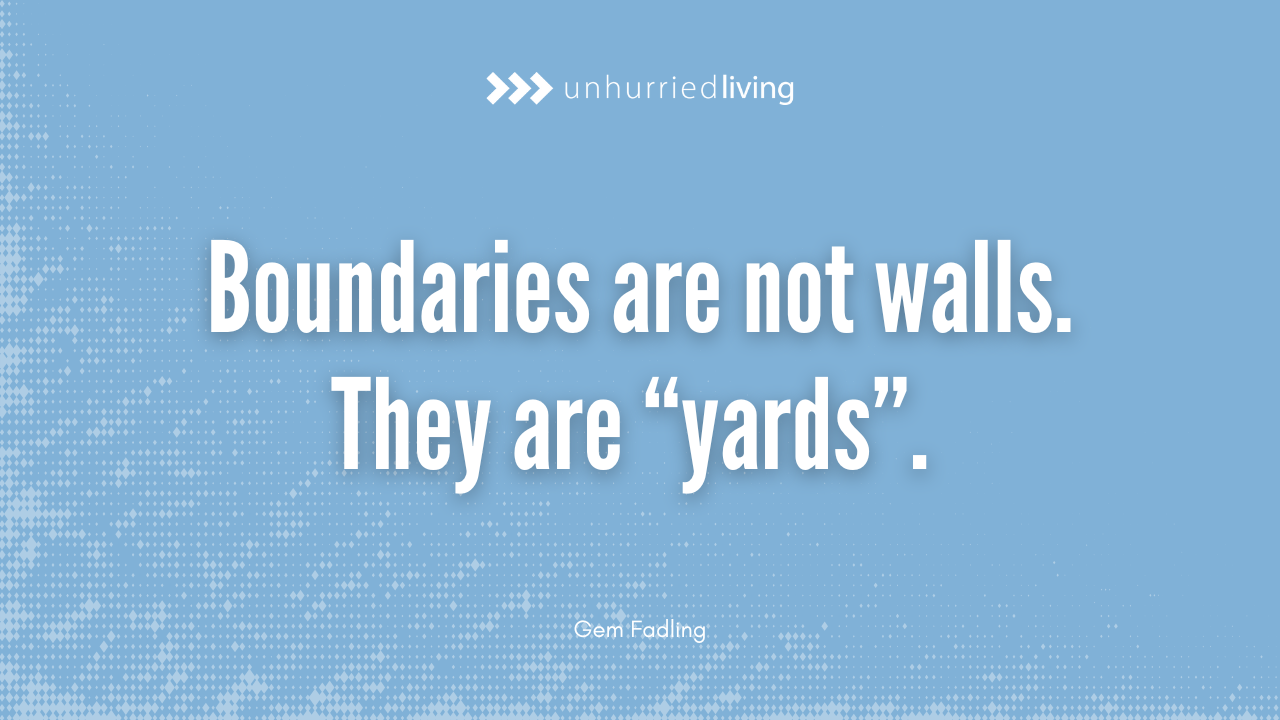Setting Boundaries with Grace and Courage
Oct 08, 2025
Blog by Gem Fadling
Have you ever found yourself walking on eggshells around someone? Maybe it’s a family member, a coworker, or even a close friend. Their words or actions leave you feeling drained, hurt, or even questioning your own worth.
Let’s explore together how to engage with difficult people in a way that honors both your dignity and theirs. We are going to look at five ways to set boundaries and stay true to yourself, even in challenging relationships.
Acknowledge the Pain
Before we dig into the five ways, let’s acknowledge the hurt. Difficult relationships are painful. Whether it’s controlling behavior or constant criticism, the wounds are real.
Romans 12 says, “If it is possible, as far as it depends on you, live at peace with everyone.” Notice it says ”if it is possible, as far as it depends on you.” That means sometimes, despite our best efforts, peaceful connection isn’t fully attainable. And that’s not a failure, it’s just how it is with some people.
We don’t control others. They still get to decide how they will act and what they will do. The good news is that we get to do the same. We can choose to relate to others in healthy ways, even if they do not receive it.
So, take a deep breath. It’s okay to admit that someone’s actions are hurting you. Feeling this pain means you’re human. And the good news? You’re not powerless. You have choices.
Let’s look at five ways you can respond with grace and strength.
Know Your Worth
Before you even respond to difficult behavior, it’s good to remember your own value. Ephesians 2 reminds us that “we are God’s masterpiece.” Engaging this reality allows some holy confidence to bolster you from within.
You can grow to acknowledge your own thoughts and feelings without needing others to affirm them. Remind yourself: “I am loved by God, and my thoughts and feelings matter.”
This is not a Band-Aid-sized idea. For some of us it may take a little time to believe this more deeply. But continue to practice remembering you are a beloved child of God. And then let this inform your intentions and actions.
Set Clear Boundaries
Boundaries are not walls. They are “yards” that protect your emotional well-being.
On his website, psychologist Dr. Henry Cloud says this:
“Boundaries define us. They define what is me and what is not me. A boundary shows me where I end and someone else begins, leading me to a sense of ownership. Knowing what I am to own and take responsibility for gives me freedom. If I know where my yard begins and ends, I am free to do with it what I like.”
As we grow in our understanding of what Dr. Cloud teaches, we can learn to practice clear communication. For example, you could say, “I can’t continue this conversation if the tone remains hurtful.” You’re not rejecting the person; you’re setting a boundary around the harmful behavior.
You get to decide how you will be treated, so set clear boundaries. And this doesn’t have to be done with a jackhammer. You can state your desire simply and clearly, and with as much grace as you can muster. Which leads us to our next point…
Speak Truth with Grace
It’s tempting to either explode in anger or remain silent to avoid conflict. But we can be honest without being harsh. You don’t have to match the toxicity of the other person.
Try using “I” statements to express your feelings without blaming: “I feel hurt when my ideas are dismissed.” “I” statements can keep you from becoming defensive.
Holy confidence can be accessed here to graciously say what you need or want. And if you don’t feel equipped to have an exchange with someone, that moves us into our next idea…
Seek Wise Counsel
You don’t have to navigate this alone.
Seek out a trusted and wise friend, a mentor, a coach, or a therapist. Sometimes an outside perspective helps us see what we’re too close to recognize. A spiritual director can also help you discern how God might be inviting you to move through this relationship.
I have benefited greatly from trusted friends, my spiritual director, and my therapist. I have found more freedom and healing as I lean into my own dynamics. I not only know myself better, but I know how to communicate with others in a healthier way.
And if you don’t have access to or can’t afford this type of support, there are many books written on the topic of boundaries. And Dr. Henry Cloud is a foremost expert on this. Get the support you need.
Practice Forgiveness
Forgiveness isn’t about excusing bad behavior, it’s about releasing your heart from bitterness. You don’t have to continue to tolerate the bad behavior of others. You do get to choose not to let resentment control you.
Forgiveness sets you free and keeps bitterness at bay, even if the relationship remains complicated. Again, on this one you might need some support to make your way. The same support I mentioned in seeking wise counsel would apply here.
Dealing with difficult people is one of life’s hardest challenges, but you don’t have to navigate it alone. God is with you, offering wisdom, strength, and connection.
By knowing your worth, setting boundaries, speaking truth with grace, seeking wise counsel, and practicing forgiveness, you can engage these relationships with courage and compassion.
For Reflection:
- How do you feel about setting boundaries? What part do you struggle with?
- How might you receive the invitation to acknowledge and work through the pain you have endured in a difficult relationship?
- Which part of the process seems most helpful to you?
- Talk to God about all of this and see where it leads you.


